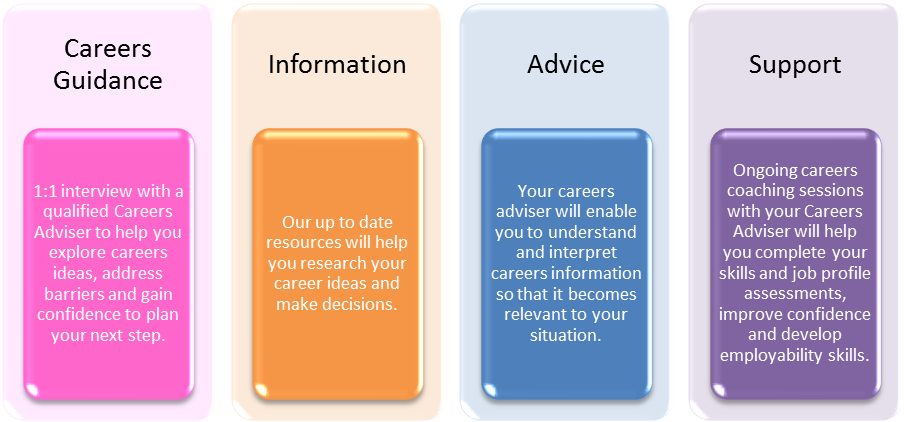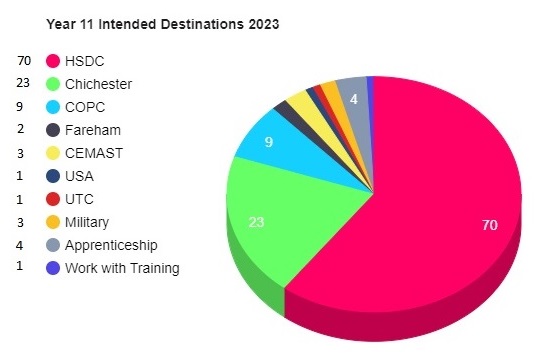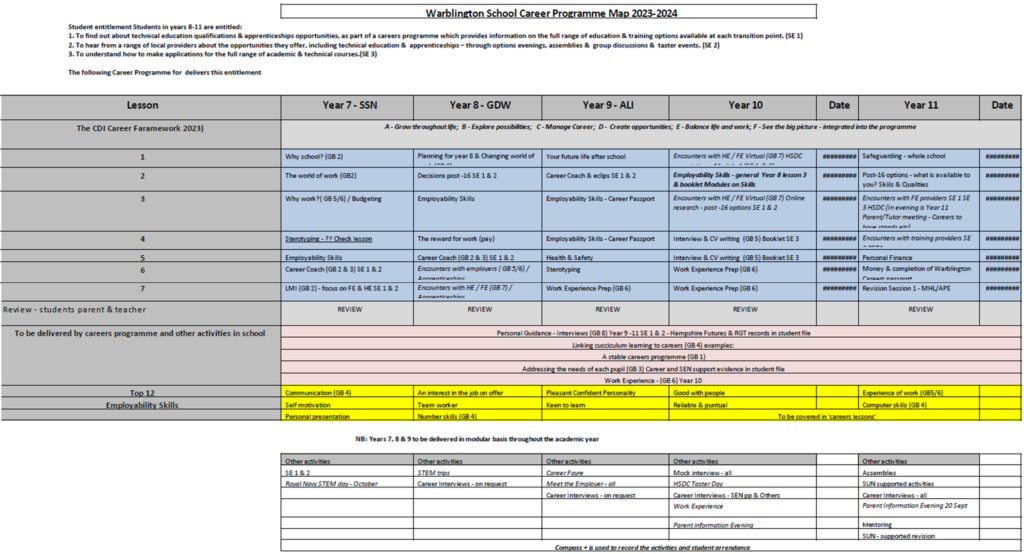CAREERS EDUCATION / POST 16
Careers Education & Guidance Programme
Warblington School is committed to providing our students with a comprehensive programme of Careers Education, Information, Advice and Guidance (CEIAG) and Work Related Learning (WRL) throughout Years 7-11.
Username: careerswarblington
Password: extra
Pupil Entitlement
Pupils in Years 8-11 are entitled to:
- Find out about technical education qualifications and apprenticeship opportunities, as part of a careers programme which provides information on the full range of education and training options available at each transition point;
- Hear from a range of local providers about the opportunities they offer, including technical education and apprenticeships – through course choice evenings, assemblies and group discussions and taster events;
- Understand how to make applications for the full range of academic and technical courses.A number of events, integrated into the school’s careers programme, will offer providers an opportunity to come into college to speak to pupils and/or their parents/carers.
Management of Provider Access Requests
A provider not already working with the college and wishing to request access should contact Mr R Gellett or Mrs Lucy Fletcher on 02392 475480 or email [email protected] or [email protected]. We are happy to include work with all stakeholders.
Careers Development
We endeavour to work towards the Careers Development Institute Framework for careers, employability and enterprise education 7-19 (November 2015), the DFE Careers guidance and inspiration in schools’ Statutory guidance (July 2021) and other good practice guidance from the Department of Education, Ofsted and other relevant bodies. The school is also working to complete all 8 Gatsby Benchmarks, a sign of excellent CEIAG, as soon as possible. The school holds the Quality in Careers Standard. This was re-assessed in July 2021. It will be re-assessed in March 2024.
Careers and work related education is an important part of the wider curriculum that we offer within the school to our pupils.
We believe that every individual should be prepared for the opportunities, responsibilities and experiences of adult life, and that this preparation should be an important and distinctive element of the curriculum.
Our Careers Education Programme provides students with skills, knowledge, support and experience of the world of work to enable them to make informed career choices.
Another important element for our students is the access to independent and impartial advice and guidance, which supports them in broadening their horizons, raising aspirations and reaching their own careers aspirations.
Pupils will be making important pathway and career choices which will ultimately impact on their life. It is essential that parents and carers play an active role in exploring the options and choices which are best for their child. Students can access career information using Careers Companion (Username: careerswarblington Password: extra)
Thinking about life after Warblington School?
Hampshire County Council have developed a website with a whole host of information on education, training and local youth support: www.hants.gov.uk/yourfuture
An Apprenticeship is a program that trains a worker to become skilled in a particular trade. Apprenticeships combine hands-on work with classroom learning to train the apprentice. Apprenticeships are considered full-time employment. As the apprentice is learning, they are also applying the lessons through working.
Click Here for an Apprenticeship Parent/Carer Information Pack
Useful sites to visit include:
www.apprenticenation.co.uk – Apprentice Nation’s vision is a Britain where apprenticeships and university are equally valued. Using popular UK artists, they raise awareness of apprenticeships among diverse groups of young people, and provide them with fundamental skills to shape their future.
www.gov.uk/apply-apprenticeships – this site allows you to search all local apprenticeships vacancies from all providers
www.stevewillis.com – are specialists in gas, plumbing and electrical training
www.peta.co.uk – offer apprenticeships in a variety of specialisms including engineering, management, ICT and Business
The following colleges also offer apprenticeships in a number of subjects. Please visit their websites for more information.
Click here to view the Careers Education and Guidance Policy
Click here for the Provider Access policy
Hampshire Careers Partnership: Your Future, Your Options Booklet
40 Questions to ask when visiting colleges
National Careers Services https://nationalcareers.service.gov.uk/
Royal Navy Careers https://www.royalnavy.mod.uk/careers
Army Careers https://apply.army.mod.uk/roles
TED Talk ‘Fake it till you make it’ https://www.youtube.com/watch?v=RVmMeMcGc0Y
BBC Bitesize Careers https://www.bbc.co.uk/bitesize/careers
Barclays Life Skills https://barclayslifeskills.com/
Career Pilot https://careerpilot.org.uk/
Go Construct – Career Explorer website – build your future as an Architect, carpenter, surveyor, electrician, bricklayer, engineer… https://www.goconstruct.org/
ICould https://icould.com/
Buzz Quiz http://icould.com/buzz-quiz/
NHS Careers https://www.healthcareers.nhs.uk/we-are-nhs/we-are-nhs
Click here for Careers related videos
Labour Market Information (LMI) is a useful tool to help research future jobs in the local area, understand the skills needed for certain roles and the demand for future employment.
LMI helps to break down the complex ‘world of work’– ranging from descriptions of different careers, their entry routes, promotional prospects, salaries paid, skills and qualifications needed, etc. Crucially for young people, LMI also covers future demand – what kinds of jobs will be in demand after leaving school and what kinds of skills will be needed.
Why is Labour Market Information Important to Young People?
‘It is vital, in an environment where new industries are emerging and many of the most important jobs of the future don’t yet exist, that individuals have access to high-quality labour market information and earnings data to underpin their choices’. Anne Milton MP
LMI can be found at:
www.bbc.co.uk/bitesize/careers
https://www.gov.uk/government/publications/uk-labour-market-projections-2014-to-2024
https://nationalcareers.service.gov.uk/
T Levels: What they are
T Levels are new courses which follow GCSEs and are equivalent to 3 A levels. These 2-year courses, which launched September 2020, have been developed in collaboration with employers and businesses so that the content meets the needs of industry and prepares students for work, further training or study.
T Levels offer students a mixture of classroom learning and ‘on-the-job’ experience during an industry placement of at least 315 hours (approximately 45 days).
In time, students will be able to take a T Level in the following subject areas:
· accounting
· agriculture, land management and production
· animal care and management
· building services engineering for construction (starting September 2021)
· catering
· craft and design
· design and development for engineering and manufacturing
· design, surveying and planning for construction (now available)
· digital business services (starting September 2021)
· digital production, design and development (now available)
· digital support and services (starting September 2021)
· education and childcare (now available)
· finance
· hair, beauty and aesthetics
· health (starting September 2021)
· healthcare science (starting September 2021)
· human resources
· legal
· maintenance, installation and repair for engineering and manufacturing
· management and administration
· engineering, manufacturing, processing and control
· media, broadcast and production
· onsite construction (starting September 2021)
· science (starting September 2021)
When they will start
The first 3 T Levels are now available at selected colleges, schools and other providers across England.
A further 7 T Levels will be available in September 2021 with the remaining courses starting in either 2022 or 2023.
We have published a list of the providers who are offering T Level courses up to September 2022.
How T Levels will work with other qualifications
T Levels will become one of the main choices for students after GCSE alongside:
· apprenticeships for students who wish to learn a specific occupation ‘on the job’
· A levels for students who wish to continue academic education
We are currently reviewing post-GCSE qualifications to create a simpler, high-quality system that students, parents and employers will all understand.
T Levels are based on the same standards as apprenticeships, designed by employers and approved by the Institute for Apprenticeships and Technical Education (the Institute). We expect the total time for a T Level to be around 1,800 hours over the 2 years, including the industry placement. This is a significant increase on most current technical education courses.
This differs from an apprenticeship, which is typically 80% on-the-job and 20% in the classroom and is more suited to those who know what occupation they want to pursue, want to earn a wage and learn at the same time and are ready to enter the workforce at age 16.
How T Levels have been developed
Employers and providers have been working together to develop each T Level, with support from DfE and the Institute. Groups of employers have defined the skills and requirements for each T Level course by participating in T Level panels. This ensures that students taking T Levels will develop the technical knowledge and skills required by employers in that industry.
The T Level panels have developed the content for the qualification, based on the same standards as apprenticeships and these plans are then tested and reviewed with students, education providers and employers.
The technical qualifications for the first 3 T Levels have now been approved by the Institute and accredited by Ofqual for teaching from September 2020. These are in:
· design, surveying and planning for construction
· digital production, design and development
· education and childcare
Structure of a T Level
T Level courses include the following compulsory elements:
· a technical qualification, which includes:
· core theory, concepts and skills for an industry area
· specialist skills and knowledge for an occupation or career
· an industry placement with an employer
· a minimum standard in maths and English if students have not already achieved them
Industry placements
Every T Level includes an industry placement with an employer focused on developing the practical and technical skills required for the occupation. These will last a minimum of 315 hours (approximately 45 days) but can last longer. Employers can offer industry placements as a block, day release or a mix of these, and can discuss sharing part of the placement with another employer if necessary.
Providers will support employers offering industry placements. This will include assistance with the necessary paperwork, a careful planning process and support with designing the industry placement.
The Education and Skills Funding Agency (ESFA) and National Apprenticeship Service (part of ESFA) are working with employers and providers on industry placements.
Employers interested in finding out more about industry placements can contact 08000 150 600, email [email protected] or visit the employer section of the T Levels website.
Grading and certification
Students who complete their T Level will receive an overall grade of pass, merit, distinction or distinction*. They will get a nationally recognised certificate which will show their overall grade and a breakdown of what they have achieved.
The T Level certificate will include:
· an overall grade for the T Level, shown as pass, merit, distinction or distinction*
· a separate grade for the core component, using A* to E
· a separate grade for each occupational specialism, shown as pass, merit or distinction
It will also include confirmation that the student has:
· met the minimum requirements for maths and English qualifications
· completed the industry placement
· met any additional mandatory requirements
A student’s overall T Level grade will be worked out from the grades they achieved on the core component and the occupational specialism(s).
Students who do not pass all elements of their T Level will get a T Level statement of achievement which will show the elements they have completed.
UCAS tariff points
T Levels will provide several progression options to students. These include skilled employment, an apprenticeship and higher education.
To help T Level students get into higher education, UCAS tariff points will be allocated to T Levels.
UCAS points will only be allocated to the overall T Level grade. Students must achieve at least an overall pass grade to receive UCAS points.
|
UCAS tariff points |
T Level overall grade |
A level |
|
168 |
Distinction* (A* on the core and distinction in the occupational specialism) |
AAA* |
|
144 |
Distinction |
AAA |
|
120 |
Merit |
BBB |
|
96 |
Pass (C or above on the core) |
CCC |
|
72 |
Pass (D or E on the core) |
DDD |
Information & Resources about T Levels
2022 Activity Survey
Click here for the full report on what our Year 11 leavers went onto after leaving Warblington School
Work experience is an opportunity for young people to gain an insight into the world of work, and to help them prepare for the responsibilities and opportunities of adult life. The school encourages all students to participate in work experience. Work experience for 2024 is planned for:
Monday 13th – Friday 24th of May, 2024
Click here for the Own Placement Form
In preparation for Work Experience, college interviews, job interviews and to support apprenticeship applications, each student should have a CV prepared.
At Warblington we use Hampshire Futures CV Creator to help produce students CV’s. https://careercompanion.cv-creator.com/
If any student needs any help with creating a CV, please come and speak to the careers team.








